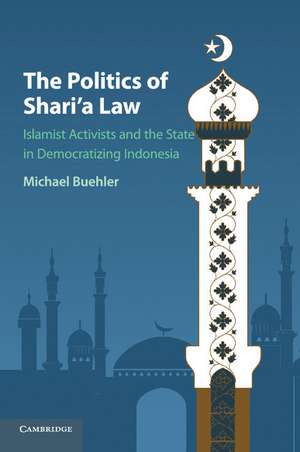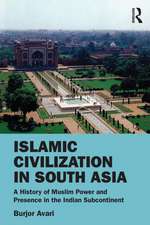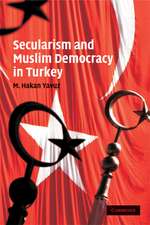The Politics of Shari'a Law: Islamist Activists and the State in Democratizing Indonesia
Autor Michael Buehleren Limba Engleză Paperback – 7 mar 2018
| Toate formatele și edițiile | Preț | Express |
|---|---|---|
| Paperback (1) | 284.98 lei 43-57 zile | |
| Cambridge University Press – 7 mar 2018 | 284.98 lei 43-57 zile | |
| Hardback (1) | 698.80 lei 43-57 zile | |
| Cambridge University Press – 31 aug 2016 | 698.80 lei 43-57 zile |
Preț: 284.98 lei
Nou
Puncte Express: 427
Preț estimativ în valută:
54.53€ • 57.09$ • 45.12£
54.53€ • 57.09$ • 45.12£
Carte tipărită la comandă
Livrare economică 07-21 aprilie
Preluare comenzi: 021 569.72.76
Specificații
ISBN-13: 9781107571167
ISBN-10: 1107571162
Pagini: 284
Ilustrații: 2 tables
Dimensiuni: 150 x 230 x 15 mm
Greutate: 0.39 kg
Editura: Cambridge University Press
Colecția Cambridge University Press
Locul publicării:New York, United States
ISBN-10: 1107571162
Pagini: 284
Ilustrații: 2 tables
Dimensiuni: 150 x 230 x 15 mm
Greutate: 0.39 kg
Editura: Cambridge University Press
Colecția Cambridge University Press
Locul publicării:New York, United States
Cuprins
List of abbreviations; Acknowledgements; Introduction; 1. How state elites mediate the influence of Islamist activists in Indonesia; 2. Islamist activism, the state and shari'a policymaking between 1945 and 1998; 3. State elites and institutional change; 4. The accumulation and exercise of power in local politics after 1998; 5. Islamist parties after 1998: mobilization without influence; 6. The mobilization and lobbying efforts of Islamist movements after 1998; 7. Providing political resources in exchange for the adoption of shari'a regulations; 8. Conclusion: summary of findings and avenues for future research; Appendix 1; Appendix 2; Appendix 3; Bibliography; Index.
Recenzii
'Buehler's provocative study asks us to think twice before making facile assumptions about political parties, civil society and 'Islamisation' in post-Soeharto Indonesia. His conclusions will not go unchallenged, but the scholarship is superb, and the richness of the data, in terms of both geographic scope and historical depth, makes for a fascinating study about how old elites try to manipulate new sources of political legitimacy in a democratizing state. Buehler shows how a partnership of political opportunists and pious activists can produce Islamist outcomes without strong Islamic political parties. This is a book guaranteed to stimulate argument and debate.' Sidney Jones, Director, Institute for Policy Analysis of Conflict, Jakarta
'This is an excellent study of local politics and the dynamics of Islamisation in Indonesia in the years of post-authoritarian transition. Based on detailed case studies, Buehler provides a convincing explanation of the seeming paradox that Islamist political parties performed poorly in elections but the Islamisation of public life was in fact carried forward by secular local politicians, many of whom still belonged to the elite of the ancien régime. His observations on how democratisation enabled vocal (Islamist) pressure groups based outside the political system to have a greater impact on decision-making than Islamist parties within the system have relevance beyond the specific case of Indonesia.' Martin van Bruinessen, Universiteit Utrecht, The Netherlands
'Michael Buehler has produced a fine piece of scholarship on contemporary Indonesian politics that engages several important literatures - religion and politics, democratic transitions, social movement theory, and questions of democratic representation and accountability. This book is excellently researched, focusing on historically grounded case studies across multiple regions. Buehler examines a curious puzzle: Islamic parties and candidates have not fared well in Indonesian elections since 1998, and yet there has been a surge in Islamic laws at the local level championed mostly by vote-hungry candidates from non-Islamic parties. He emphasizes the short-term strategizing and competition among political elites who do not intend Indonesia to become an Islamic state, even if the effect of their opportunistic electoral politics across several regions nudges the country increasingly in that direction. Buehler advances a bold thesis that is illuminating not only for Indonesia, but for other Islamic countries as well.' Jeffrey Winters, Northwestern University, Illinois
'Who is pushing most for new shari'a regulations in Indonesia? To address this question Buehler has created a pioneering data set on 443 shari'a regulations which he adroitly analyses with a rich range of concepts. Buehler counterfactually shows that almost all of these shari'a regulations have been passed by secular bureaucrats who were looking to get some political, and often financial, gain. He also illustrates that one of the reasons for the decline of total vote of Islamic political parties is that they are ideologically multi-vocal and join many different competing party coalitions, often with secularist allies. Buehler's book, based on over fifty months of theoretically sensitive field research, has resulted in a wonderful conceptual and empirical enrichment to the literature on democracy and Islam.' Alfred C. Stepan, Wallace S. Sayre Professor of Government, Founding Director of the Center for the Study of Democracy, Toleration and Religion, and Co-Director of the Institute for Religion, Culture and Public Life, Columbia University, New York
'This is an excellent study of local politics and the dynamics of Islamisation in Indonesia in the years of post-authoritarian transition. Based on detailed case studies, Buehler provides a convincing explanation of the seeming paradox that Islamist political parties performed poorly in elections but the Islamisation of public life was in fact carried forward by secular local politicians, many of whom still belonged to the elite of the ancien régime. His observations on how democratisation enabled vocal (Islamist) pressure groups based outside the political system to have a greater impact on decision-making than Islamist parties within the system have relevance beyond the specific case of Indonesia.' Martin van Bruinessen, Universiteit Utrecht, The Netherlands
'Michael Buehler has produced a fine piece of scholarship on contemporary Indonesian politics that engages several important literatures - religion and politics, democratic transitions, social movement theory, and questions of democratic representation and accountability. This book is excellently researched, focusing on historically grounded case studies across multiple regions. Buehler examines a curious puzzle: Islamic parties and candidates have not fared well in Indonesian elections since 1998, and yet there has been a surge in Islamic laws at the local level championed mostly by vote-hungry candidates from non-Islamic parties. He emphasizes the short-term strategizing and competition among political elites who do not intend Indonesia to become an Islamic state, even if the effect of their opportunistic electoral politics across several regions nudges the country increasingly in that direction. Buehler advances a bold thesis that is illuminating not only for Indonesia, but for other Islamic countries as well.' Jeffrey Winters, Northwestern University, Illinois
'Who is pushing most for new shari'a regulations in Indonesia? To address this question Buehler has created a pioneering data set on 443 shari'a regulations which he adroitly analyses with a rich range of concepts. Buehler counterfactually shows that almost all of these shari'a regulations have been passed by secular bureaucrats who were looking to get some political, and often financial, gain. He also illustrates that one of the reasons for the decline of total vote of Islamic political parties is that they are ideologically multi-vocal and join many different competing party coalitions, often with secularist allies. Buehler's book, based on over fifty months of theoretically sensitive field research, has resulted in a wonderful conceptual and empirical enrichment to the literature on democracy and Islam.' Alfred C. Stepan, Wallace S. Sayre Professor of Government, Founding Director of the Center for the Study of Democracy, Toleration and Religion, and Co-Director of the Institute for Religion, Culture and Public Life, Columbia University, New York
Notă biografică
Descriere
An original and timely exploration of the continuing Islamization of Indonesian politics despite the electoral decline of Islamist parties.












